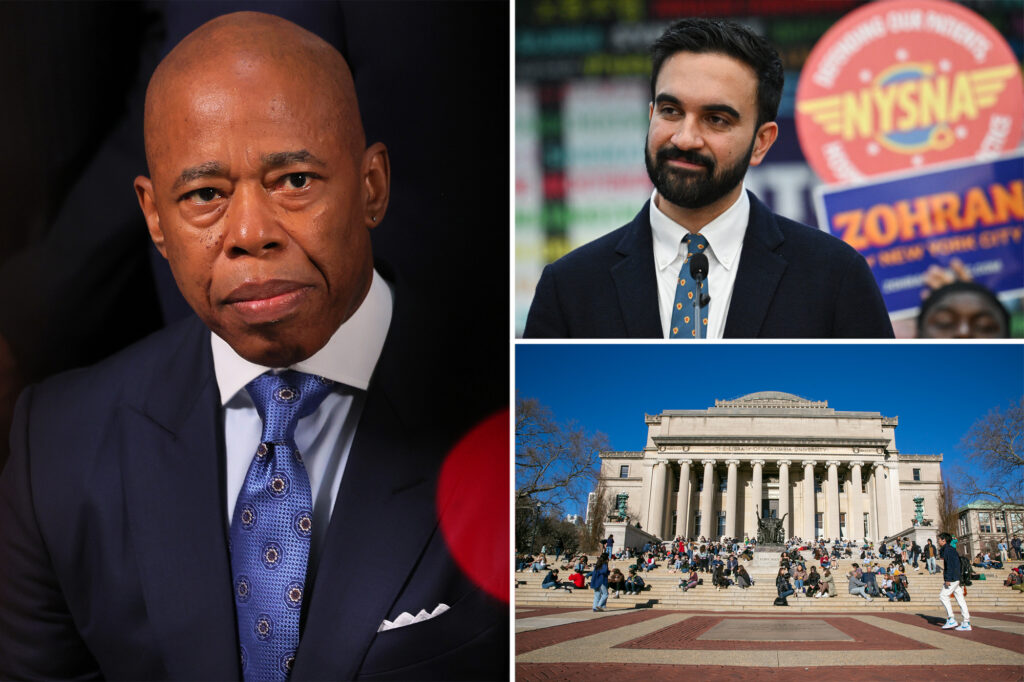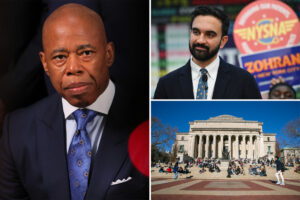
New York City Mayor Eric Adams has called on Columbia University to release the admission records of Zohran Mamdani, a Democratic socialist candidate in the city’s mayoral race, who identified as both Asian and African American on his college application. This request comes amid allegations that Mamdani misrepresented his racial identity to gain an advantage in the admissions process.
Mamdani, a 33-year-old Muslim immigrant from Uganda, applied to Columbia in 2009 before becoming a U.S. citizen. He reportedly checked both “Asian” and “African American” on his application, explaining to The New York Times that neither category alone fully captured his identity. Although his application was ultimately rejected, Mamdani clarified in another section of the form that he was Ugandan. He was naturalized as a U.S. citizen in 2018 and currently holds dual citizenship with Uganda.
Mayor Adams, who is African American, expressed outrage over Mamdani’s actions, describing them as an affront to those who have faced systemic barriers in higher education. “The African American identity is not a checkbox of convenience. It’s a history, a struggle, and a lived experience. For someone to exploit that for personal gain is deeply offensive,” Adams stated.
Political and Ethical Implications
The controversy has sparked a broader debate over identity and representation in college admissions, especially in the context of affirmative action policies designed to address historical inequities. Adams’ campaign accused Mamdani of potentially depriving a genuine African American applicant of a spot at the prestigious university.
“It’s now clear that Zohran Mamdani misrepresented his racial identity to gain admission to Columbia University, and at the time, he wasn’t even a U.S. citizen. This is not just dishonest — it’s possibly fraudulent,” said Todd Shapiro, a spokesperson for Adams’ campaign.
The campaign has demanded that Columbia University investigate whether Mamdani’s non-citizen status influenced their admissions decision and to clarify if any university policies were violated. The demand for transparency comes amid heightened scrutiny of college admissions practices nationwide, particularly following high-profile scandals and legal challenges to affirmative action.
Background and Broader Context
Mamdani’s father, Mahmood Mamdani, is a respected professor at Columbia, specializing in anthropology, political science, and African studies. His tenure at the university since 1999 adds another layer of complexity to the situation, as questions arise about potential conflicts of interest.
This incident is reminiscent of past controversies involving racial identity in academia. Similar debates have emerged around figures like Rachel Dolezal and Elizabeth Warren, who faced backlash for their claims of minority status. These discussions highlight the ongoing tensions surrounding race, identity, and privilege in American society.
Public Reaction and Political Ramifications
Mamdani is currently leading in the mayoral race, according to an American Pulse survey, with 35% of voter support. His closest competitor, former Governor Andrew Cuomo, trails with 29%, while Adams, running as an independent, has 14%. The controversy could impact Mamdani’s campaign, as voters weigh the ethical implications of his past actions.
Meanwhile, the leak of Mamdani’s application, reportedly by a “hacktivist,” raises concerns about data security and privacy at educational institutions. The breach, affecting over 2 million university members, underscores the vulnerabilities in handling sensitive information.
Looking Ahead
As the mayoral race intensifies, the demand for transparency and accountability from Columbia University remains a focal point. The outcome of this controversy could influence public perceptions of both Mamdani and the broader issues of racial identity and admissions practices.
The unfolding situation serves as a reminder of the complexities surrounding identity in America, where personal narratives intersect with systemic structures. As the election approaches, New Yorkers will be watching closely to see how these issues are addressed and what implications they may have for the city’s leadership.







